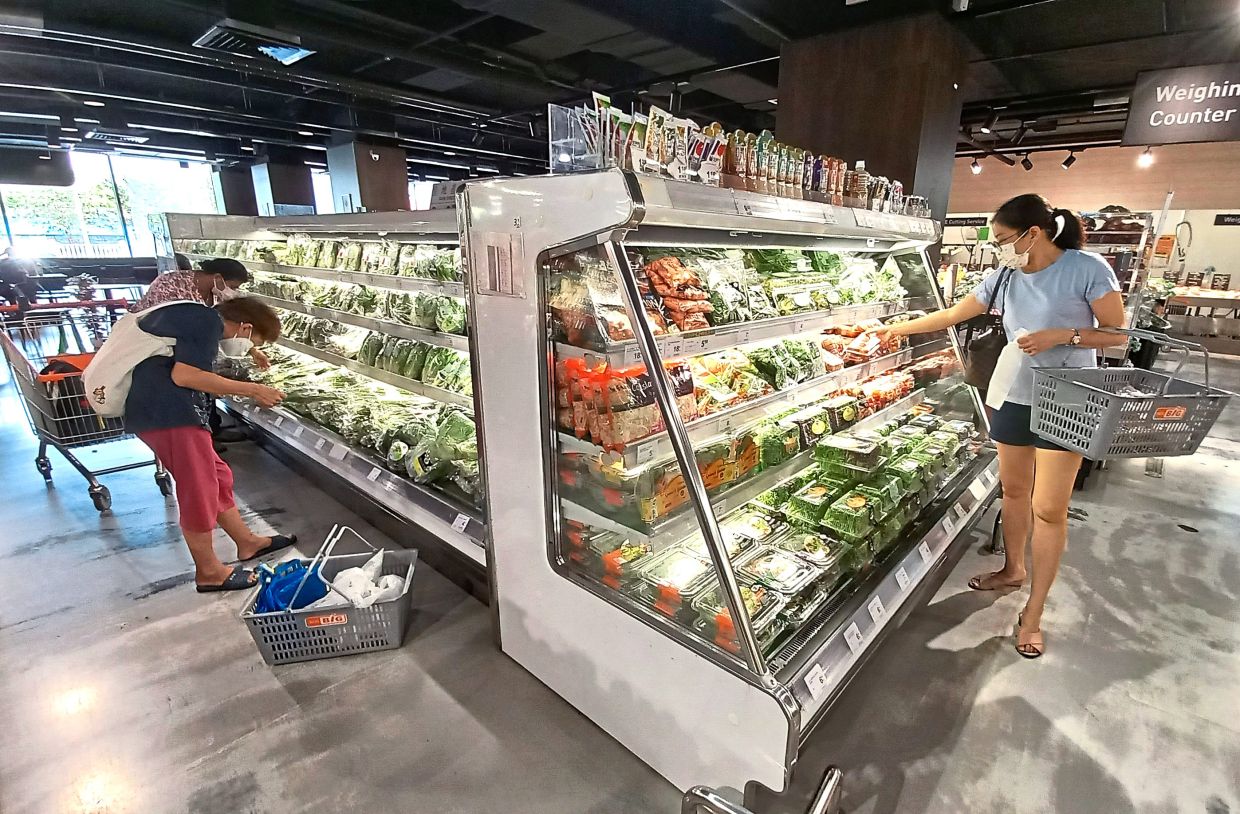
High prices: The weak ringgit has led to the rising cost of imported goods, especially food. – GLENN GUAN/The Star
THE coming months will be rough. No one knows for sure how long it will last as the world grapples with inflation and the prospect of a global recession.
It has hit nearly every country in the world and Malaysia hasn’t been exempted.
Politicians who’ve called for street demonstrations protesting the rising prices of essential items or to demand a return of subsidies are just being opportunistic.
And it’s not because they have any real solutions to resolve the economic headaches either.
These politicians know the public is upset, even if the people are aware of the effects of the Ukraine war and supply chain disruptions.
Last week, Bank Negara Malaysia decided to increase the OPR (overnight policy rate) by another 25 basis points (bps) to 2.25%.
So, the rising interest rates will make borrowing or loan servicing more expensive, especially for businesses and households with existing loans, but it will be good news for those with savings in banks.
The increase will reportedly ease inflation and help support the weakening ringgit, not just against the US dollar but other currencies, too.
The depreciating ringgit has long been a source of frustration for Malaysians. The weak ringgit has led to the rising cost of imported goods, especially food.
We spent in excess of a whopping RM55bil on our food import bill in 2020.
“The weakening ringgit will have a strong impact on imported inflation. This would result in transfer pricing to consumers as cost of living will rise.
“There is a high risk for some under the M40 group to fall into B40 and more of the B40 sliding further,” revealed Ambank Research last week.
It’s hard to explain to ordinary Malaysians that the weak ringgit is because of the stronger dollar from the super-sized rate hikes by the US Federal Reserve, especially when most people prefer to believe what social media feeds tell them.
When times are bad, especially when the pocket is pinched, reasoning takes a back seat. Economics and business analysis don’t make the sexiest news bites.
Perhaps it’s best that only selected Cabinet ministers who understand the issues be allowed to talk to the media.
Malaysians are sick of incompetent politicians and officials who are incapable of engaging intelligently.
For God’s sake, please don’t advise the public to eat fewer eggs when that’s the cheapest source of protein for most Malaysians.
But that’s what happened when one state official from the Domestic Trade and Consumer Affairs Ministry shared her economic nous. I would suggest that our politicians and officials research how other countries have tackled inflation, with practical austerity ideas, sans being condescending or insulting our intelligence.
I salute Mydin Hypermarket boss, Datuk Ameer Ali Mydin, for uploading a video on social media on what value RM50, RM100 and RM200 can offer at his outlets.
It’s a clever marketing and advertising plan that’s executed simply and cleverly – without having to spend millions of ringgit.
If our ministers lack a proper communication strategy, the fallout will be costly because inaccurate social media messages will only generate negative traction.
Many irate Malaysians only want to know why the ringgit is sliding, even against our neighbours’ currencies.
More importantly, while we struggle, politicians are busy squabbling over who should be Deputy Prime Minister, replacing a Minister who has hopped to another party and worse, indulging in inconsequential issues which make a mockery of Malaysia.
The federal government has now found itself in a bind. The window period for a general election is gone as the predicted inflation has hit home.
If it holds on until July 15, 2023, when the term of Parliament expires, the government better hope the Ukraine War would have ended and the world’s food production has recovered.
Somehow, it doesn’t look likely, especially with most economists predicting tougher months ahead.
Without the subsidies, the biggest in Malaysia’s history, it will be impossible to retain Malaysia’s official inflation rate of 2.3%, which is among the lowest in the world.
Malaysia is one of the most subsidised nations on Earth, a fact which most Malaysians have taken for granted. Unfortunately, that’s also unsustainable in the long run.
“Without subsidies, inflation should be around 11% as opposed to 2.8%. And the subsidy is costing the government over RM71bil. The weakening ringgit will add more to the import bills,” Ambank said.
The central bank’s foreign reserves of US$109.2bil (RM483bil) as of June 15, 2022, was the lowest since early 2021, and the drop of US$3.6bil (RM16bil) from May 31, 2022, was also the largest in seven years, according to Bloomberg calculations, The Edge reported.
However, it said, economists don’t think the decline in international reserves has reached alarming levels yet as the reserves’ position is sufficient to finance 5.5 months of imports of goods and services and is 1.1 times the total short term external debt.
In a nutshell, we are holding well. We are not like Sri Lanka, but we can’t afford to allow the fall in our reserves to continue at this rate.
There are expectations that there will be further increases in lending rates, with Ambank saying “we gather that a 50bps one-off seems highly unlikely.”
“We are of the view that OPR will end at 2.5% – 2.75%, suggesting another 1-2 more rate hikes with another two hikes in 2023 to 3.00% – 3.25%,” it added.
The Edge also reported that a hike is expected in September to 2.5%.
The most effective way to increase our reserves is to simply build up our revenue. Spending is the easy part, but we need to earn more to halt the slide, too.





